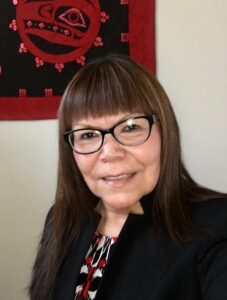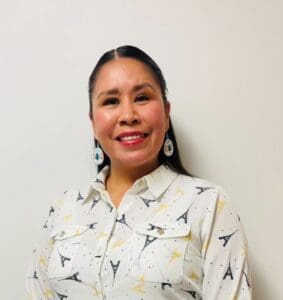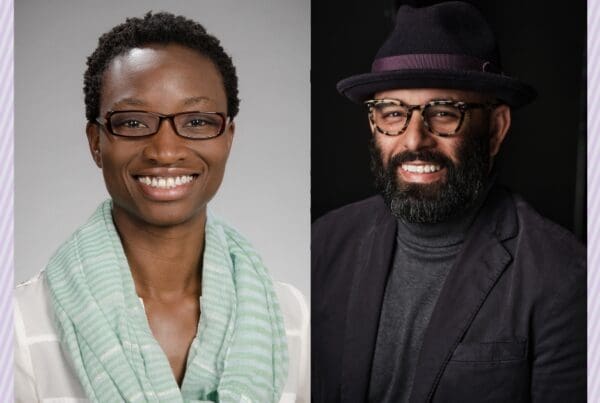While November is Native American Heritage Month, it is important to recognize Indigenous peoples and celebrate their cultures and traditions year-round.
There are over 570 federally recognized tribes in the United States, plus tribes that have not received federal recognition. All tribes have a rich history on and connection to this land — and they are still here, living and continuing to teach new generations traditional ways.
Just as there is diversity across all tribes, there is diversity in the language used to describe Native peoples. Indigenous is a broad term that can refer to any people who are descended from the original inhabitants of a place prior to settler colonialism. (Which means there are Indigenous peoples throughout the world.) Native American and American Indian refer specifically to Indigenous peoples of North America; Alaska Native is often used to refer to people who are indigenous to Alaska.
We asked several Native American community members across UW Medicine what they take pride in about their heritage, what they want people to know about their cultures, and what our organization can do to honor those cultures.

LeeAnna Muzquiz
LeeAnna Muzquiz, MD, Associate Dean for Admissions, UW School of Medicine
Tribal Affiliation: Confederated Salish and Kootenai
“My heritage connects me to the people, beliefs, values, traditions that have helped define who I am today. My strong connection to family, community, nature, and teaching is rooted in my Kootenai and Salish heritage.
Many of our cultural traditions are ceremonies and dances that are sacred and necessary to our People’s existence and survival so I honor and appreciate them in that way. There are also generalized Native American traditions such as pow wows and other celebratory gatherings that are always fun and a good way to connect with others. In my family we all gather together for the first three nights of the new year to start it off in a good way with traditional dancing and singing/praying for us as individuals, as a family and for our community and world. That is one of the most meaningful and important traditions to me.
This is not necessarily about my specific tribal culture, but I do wish that more people recognized that Indigenous People are not a historical people. Not just to be recognized during one day or month of the year but rather know that Indigenous people are in our cities and towns and some still do live on reservations, but in a modern way, with modern successes and struggles. Also that we are not a homogenous group of people, there is not just one way of being Indigenous.
We should continue to incorporate the history of the original people and those still present in the story and fabric of UW Medicine. This might be reflected in the physical aspects of our buildings such as artwork, architecture, music, etc. as well as in the institutional representation such as more Indigenous staff, faculty, resident and student voice inclusion and recognition in decision and leadership roles.”

Millie Kennedy
Millie Kennedy, Tribal Liaison, Indian Health Pathway, Office of Healthcare Equity
Tribal Affiliation: Tsimshian
“Every day is a great day to be indigenous! I am proudly an enrolled member of the Tsimshian Tribe, a small Native village located in Southeast Alaska. My Tribe migrated from British Columbia to Alaska in the late 1800’s where my First Nations relatives are still located. I belong to the Raven Clan that comes from my mother’s side where my people are traditionally matrilineal. Our clan is our pride.
I am also first gen educated in my family with a Juris Doctorate degree ending up in law school in a roundabout way. Having worked at the School of Medicine’s Native American Center of Excellence in an earlier life, I saw Indigenous students get into and through medical school to become doctors and that inspired me to go to law school. After practicing law for several years, I recently returned to the UW Medicine’s Office of Healthcare Equity as the Tribal Liaison to the Indian Health Pathway. Working now with amazing Indigenous doctors and students, I am very excited that the Indian Health Pathway has expanded tremendously and is addressing Native American and Alaska Native Healthcare inequities including important issues such as data collection inequality.
I enjoy participating in cultural events such as Canoe Journey, potlatches and powwows. You can honor Native American Heritage month by understanding Native Americans are extremely diverse in the U.S. with 574 Federally Recognized Tribes, several non-Recognized Tribes and large Urban Native American populations, and also learn whose land you are on. We’re still here.”

Sherri ThunderHawk
Sherri ThunderHawk, CNA/OR Secretary PSA
Tribal Affiliation: Cheyenne River Sioux
“When I am asked about my background, I like most Indigenous people will always say I am proud of my heritage and where we come from. I was born and raised in Eagle Butte, South Dakota, where I am an enrolled member of the Cheyenne River Sioux tribe.
In 1978 I became a ward of state. During this time a grassroots activist was fighting for the rights of native children in foster care. Madonna ThunderHawk not only helped get the Indian Child Welfare Act enacted, but also gained custody of me. Madonna was part of the American Indian Movement which was established in 1968 along with the late Russell Means and Denis Banks. I was raised by legends, heroes and outlaws. As a child I was taught my traditions, language and survival skills, while my aunts and uncles were making their voices heard for our rights as Indigenous people.
I have lived in Washington for many years, I’ve raised my children here, and am proud to part of the native community that is more like family. Together we fight alongside each other to help bring change and awareness to others. I believe that every day is a good day to be Indigenous.”

Miranda White
Miranda White, Admitting Supervisor, UW Medical Center – Montlake
Tribal Affiliation: Fort Peck Assiniboine and Sioux
“I am very proud of my Native American heritage. When I hear the words Native American heritage I immediately think of honor and respect. There are many Native American tribes throughout the United States and Canada. Although each tribe has their own unique traditions, languages and histories, we are all taught to honor and respect our elders, children, our mother earth and our ancestors.
Family means everything to me. Getting together as a family and talking, sharing stories and laughing is great especially when it involves cooking. Last year, I was able to go buffalo hunting back home in Montana and my mom shared stories as she was prepping the meat for soup.
The general public needs to realize that we are still here. Native Americans have a rich culture. The history of our people need to be correctly told and taught in school. It should not be eliminated. Native Americans have made many contributions, sacrifices and achievements for our society. After years of attempted genocide and other historical trauma, we are still here. We are living, growing, learning and thriving. We are resilient.
It’s important to not have preconceived or stereotypical outlooks on Native American patients. Always remember that most Native Americans come from underserved and underfunded Native American communities especially when you consider the large WWAMI region. There needs to be a careful balance of practicing medicine while respecting cultures and beliefs.”
Learn what Native land you are on with an interactive map: native-land.ca.


